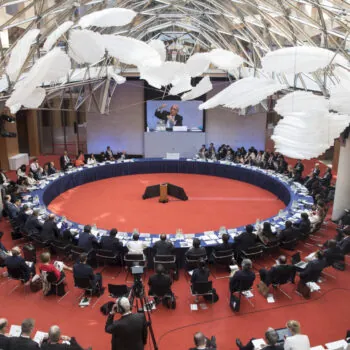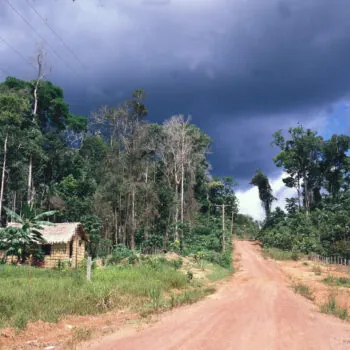The global climate agreement to be signed in Paris isn’t a done deal. If you thought targets and trajectories in climate policy were techy, get ready for ‘architecture of the Agreement’. But this topic – top of EU environment ministers’ agenda this Friday – really counts. Will Paris simply sign and seal the national pledges that have already been submitted? Or can governments in December agree a forward regime that confronts what preventing dangerous climate change really means and holds them to account? European discussions this week can be decisive.
While the success of international climate negotiations has often crudely been reduced to percentages of emission reductions alone, Paris is a different beast. We’ll know most of the numbers in advance. We’ve already got pledges covering nearly two-thirds of global emissions. And while the contributions put forward so far are a sign of progress – most of these countries have never put forward such a target before – we already know we’ll need to go much further to really grip the problem. Current pledges put us on track to exceed the temperature limit of 2°C that the international community has set as the threshold for ‘unmanageable’ climate change.
If we’re serious about tackling climate risk, our work into Paris can’t be focused on simply getting a ‘deal’ that slots nationally determined targets into an international agreement. That work has been going on in national capitals across the world for years. We’re ready to move on to the next stage. That’s why Europe’s environment ministers this week will focus on the building blocks of a deal that goes beyond 5 or 10 year targets: the architecture of a much more durable global pact to get climate change under control.
What kind of ‘architecture’ do we need?
If Paris is going to accelerate decarbonisation across the world, as we so desperately need, the agreement needs to deliver confidence that getting off fossils fuels is inevitable and irreversible. This means securing international consensus that really gripping climate change means a clear end-point: zero carbon. This kind of global long-term goal translates what limiting global temperature rise below 2°C means in practice. But to make clear that the world is only going in one direction, we also need a clear and transparent process where we can regularly assess how much more we need to do to get on track.
This is why a long-term goal must be accompanied by political moments every 5 years that compel countries to come up with their next, more ambitious target (with civil society and all who recognise the risks actively pushing their governments in these domestic debates worldwide). Setting up a process to assure future ambition may not sound like fireworks over the Arc de Triomphe, but we all know we’re not going to ‘solve’ climate change in a two-week conference. This is about holding our governments to account as they play their part in shifting the global economy completely off fossil fuels within a generation.
The moment to lay the building blocks is now
These building blocks need to be agreed by Paris, to help us see beyond Paris when these targets will translate into decarbonisation on the ground, all around the world.
Given how long it has taken to get to this stage, we don’t have the time to negotiate a whole new treaty if the Paris deal only runs up to 2030 – and we can’t let countries lock in targets now that won’t be renewed for another 15 years. Think about how much the world has changed in the last five years alone: climate is now a key part of US-Chinese strategic relations; renewable energy technology has got better and cheaper at a faster pace than anyone had predicted; we’re seeing huge divestment as coal’s stock plummets; and, tragically, extreme weather events are hitting communities harder and more regularly than ever before. Ensuring that governments have to put forward a new, more ambitious target in sync with each other can shift the dynamic in international negotiations away from a playing-it-safe approach to the bold action we need to see.
Setting up 5 yearly cycles with the teeth to increase ambition can improve pledges before the Paris Agreement even comes into force in 2020. Governments have left themselves room to increase ambition, from the EU’s ‘at least’ 40%, the US’ projected range of 26-28%, and China’s inclusion of an intention to peak emissions sooner than its 2030 announcement would suggest. We need the flexibility in these pledges to be held to account. The best way to do this is for all governments to know the next moment they’ll be urged to do better is just around the corner. This will also ensure that the political momentum civil society pressure has built up ahead of Paris doesn’t fall away after December, but can directly continue to energise the next round of national debates before 2020.
Where Europe can make a difference
Coming out strongly in favour of this structure is where Europe can make a difference. The unprecedented US-China joint announcement on climate last autumn overshadowed EU Heads agreeing Europe’s 2030 climate goal. However many of the EU’s allies, especially developing countries, rely on Europe to shape strong rules and transparency inside the agreement to deliver the ‘2°C obligation’ it helped champion.
Campaigners, businesses and former world leaders have all come out urging governments to set up a regime that lasts and that increases ambition over time. “Europe is not neutral when it comes to climate change,” EU Commission President Juncker asserted in his State of the European Union address last week. Friday’s ministerial is the moment to make good on Juncker’s promise that the EU “should not sign just any deal” but one that is credible on tacking climate change, now and in the future.
The time is now for progressive ministers to fight for increasing ambition every 5 years to get on track for a global goal to phase out emissions by 2050 (especially from the G7 countries, whose leaders called time on fossil fuels in June). Getting agreement on these key elements between 28 member states is no easy task. But pushback may be worse after Paris: fossil fuel companies are stepping up their obstructive lobbying while a stridently climate-sceptic party is likely to be in power in Poland, which recently claimed that “decarbonisation is completely not in our interest”. That’s why we have to get ahead of the game now, and ensure that getting a grip on carbon emissions doesn’t slip off the top table after December.


